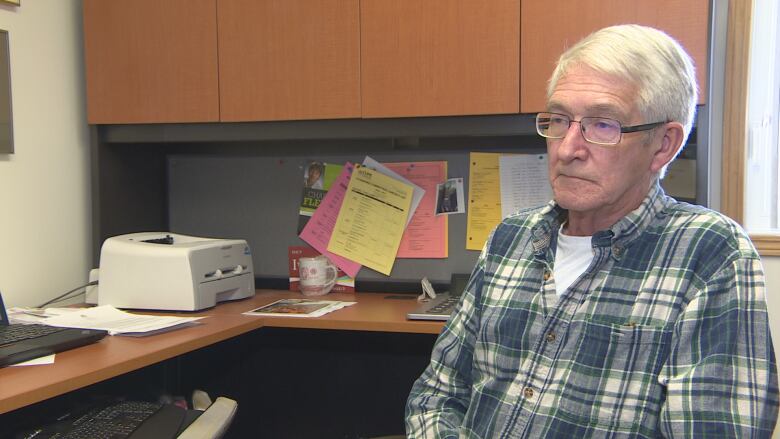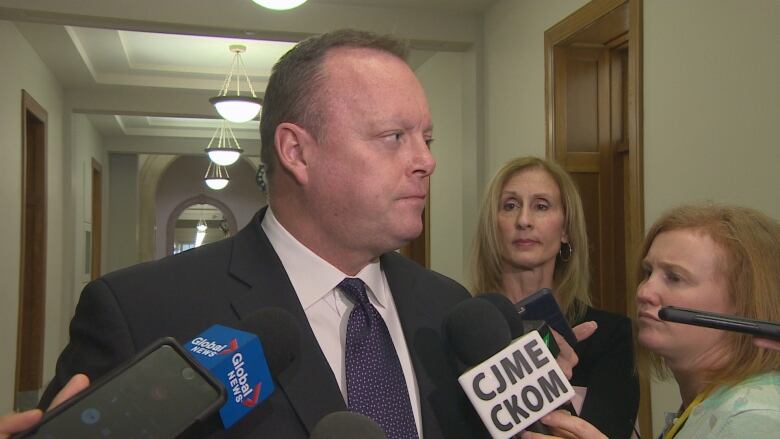Labour president says Sask. government looking for deficit 'scapegoat'
Government letter asks for public service employee compensation cap

The president of the SaskatchewanFederation of Labour saysthe government is blaming workers for its own mismanagement.
A letter was distributed by the government to public sector services on Friday askingfor a cap on employee compensation.
"This is calculated. The government is looking for a scapegoat," said federation president Larry Hubich.
"Attacking public sector workers;attacking the students who go to our schools; making patients pay for the cost of government's ridiculous spending particularly on theirmegaprojects is really heartless," saidHubich.
The letter suggested considering a freeze on wage increases, range increments and performance or bonus pay and opening collective bargaining to meet the new directive.
The government said its goal is tackling its $1-billion deficit.
Hubich said the government is"looking for someone to beat up on and it happens to be their own employees, so they can continue with the narrative that the real problem in Saskatchewan isn't that they're incompetent, it's that it's everybody else's fault."
Spending money 'like drunken sailors'
The president of Saskatchewan's Canadian Union of Public Employees (CUPE) chapter agreesunwise spending is now being downloaded to government employees.
"They've spent money I'll use the old analogy like drunken sailors," said Tom Graham.
"They've spent moneyunwiselyinour estimate. The Regina bypass started out at $400 million;it's now $1.8 billion."

Graham said he does not believe the province's cost-cutting measures, with regards to workers, will impact the deficit.
"I view this as them trying to cause a distraction from the real issues. Unfortunately, it's goingto be very harmful to people I representif in fact they do see wage rollbacks or layoffs."
Potential legal challenges
The letter, written by deputy premier Don Morgan, said wages paid in 2016-17 totalling $7.1 billion cannot grow in the next year.
"Morespecifically,forthegovernmentfiscalyear2017-18totalcompensationcostswillbeno greaterthan2016-17.Negotiationsneedtocommenceimmediatelyinordertoachievethese goals for in-scope employees prior toApril 1, 2017," Morgan wrote.
Not all public sector contracts are in the midst of bargaining. Here's a breakdown:
- 40 unions in all representing more than 64,000 workers.
- 25 unions have concluded contract agreements with the government.
- 10 of those expire by March21.
- 15 others are in open negotiations.
Morgan's message that "negotiationsneedtocommenceimmediately,"is being met with questions fromHubich.
"To go in and unilaterally open an agreement and roll back the wages, I think they would have a legal hurdle to overcome,"Hubichsaid.
Graham said if the government tries to open negotiated contracts CUPE will use "whatever means" it has to fight back, includingtaking the province to court.
"The Supreme Court has made it clear that we have a right to collective agreements. You negotiate a contract and that contract is the contract," Graham said.
"Our success rate in court against the government has been a heck of a lot better than theirs."
Government defends position

He said it was not a "threat" of layoffs but a request for employers to start discussions with unions and employee groupsabout cost-cutting options.
"It could be a reduction in salaries at this point in time;it could be leaves of absence;it could be unpaid days;it could be layoffs," Doherty said.
The government sent the letter to 41 employer groups.












_(720p).jpg)


 OFFICIAL HD MUSIC VIDEO.jpg)
.jpg)



























































































